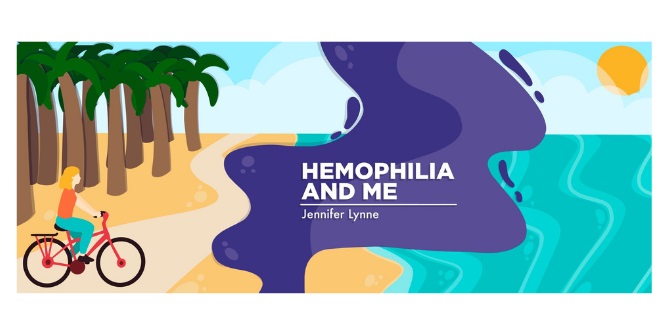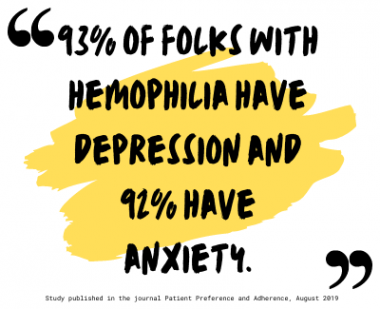
Managing Bleeding Disorders Requires Attention to Mental Health
by:
It’s easy to spot physical damage, such as swollen joints, nosebleeds, limps, and bruises, when one suffers from a bleeding disorder. But the psychological and emotional damage that may result is not as easy to see or treat.
A U.S. survey of hemophilia patients, published a few years ago in the journal Patient Preference and Adherence, concluded that 93% of survey participants experienced depression, while 92% had anxiety. Additionally, 28% reported having moderate to severe depression, and 13% had moderate to severe anxiety.
Mental Health Awareness Month, observed in May, is a good opportunity to bring more attention to these types of issues.

(Graphic by: Jennifer Lynne)
Stress and bleeding disorders
I have experienced both depression and anxiety when dealing with von Willebrand disease (VWD) and hemophilia B. Bleeding disorders cause stress in many ways, including from failed medical procedures, frequent infusions, financial stress, access to care issues, and even the impact of HIV/AIDS and hepatitis for those who lived through the 1970s and ’80s. Additionally, COVID-19 has added more stress for everyone.
For Too Long, I Thought My Bleeding Was Normal
Bleeding often happens at inopportune times. I often feel like I have no control over my body. For example, I underwent a cervical biopsy. A few days later, my sister and nephews visited me in Florida. A theme park trip was my Christmas gift to them. We were having a lovely time when I suddenly started to bleed heavily. I didn’t want to disclose the problem to my family, but eventually, I had to. We left early and I felt horrible.
Afterward, a home health nurse came to administer Humate-P infusions to treat my VWD. Unfamiliar with bleeding disorders and the medicine, the nurse once mixed the medication incorrectly, and on another occasion canceled one of my infusions. As a result, I needed anti-anxiety medication before those appointments. This motivated me to learn how to self-infuse.
The uncontrollable menstrual bleeding I used to experience was also terrifying, and when treatment didn’t work, feelings of depression would set in. I had such high hopes for treatment and didn’t understand why it didn’t work. I questioned my doctors and my diagnosis. Now I know I need factor replacement medication for both VWD and hemophilia B (factor IX deficiency).
Post-traumatic stress disorder
I also believe I may have medical post-traumatic stress disorder. PTSD is a mental health condition that’s triggered by either experiencing or witnessing a terrifying event. According to the Mayo Clinic, symptoms may include flashbacks, nightmares, severe anxiety, and uncontrollable thoughts about the event.
In the ’70s and ’80s, something our community refers to as the “hemophilia holocaust” changed the lives of everyone who experienced it. In a recent interview, bodybuilder L.A. Aguayo, who has severe hemophilia, told me, “Those that lived through the ’70s and ’80s and were diagnosed with AIDS and hepatitis from contaminated blood products went through the hardest time. We have a responsibility to keep pushing and sharing with others and creating change. There are still so many resources that we need as a community to live a fulfilling life.”
Dr. Eric Russ, a clinical psychologist with expertise in assessing and treating traumatic stress, recently held a webinar on trauma and PTSD for the Hemophilia Federation of America. According to Russ, healthy ways to cope with stress include breathing deeply, taking breaks, and setting boundaries. Other tactics include creating routines and schedules, connecting with important people in your life, seeking help when needed, and building “meaning-making” into your day in the form of advocacy or education.
Resources
The organization Mental Health Matters Too has the mission of normalizing conversations about mental health in the bleeding disorders community and providing direction on resources for mental wellness and care. Its website has lots of related material, including a screening tool and a list of resources.
The organization was founded by Debbie de la Riva, whose son was born with severe hemophilia in 1994. Debbie received a master’s degree in counseling psychology from the University of Houston and became a licensed professional counselor in 1989.
I write and am building a website to promote advocacy and education for people with bleeding disorders, especially women. L.A. Aguayo connects with people on Instagram and coaches others to make positive changes in their lives through physical activity and nutrition.
Source: Hemophilia News Today. The opinions expressed in this column are not those of Hemophilia News Today or its parent company, BioNews, and are intended to spark discussion about issues pertaining to hemophilia.